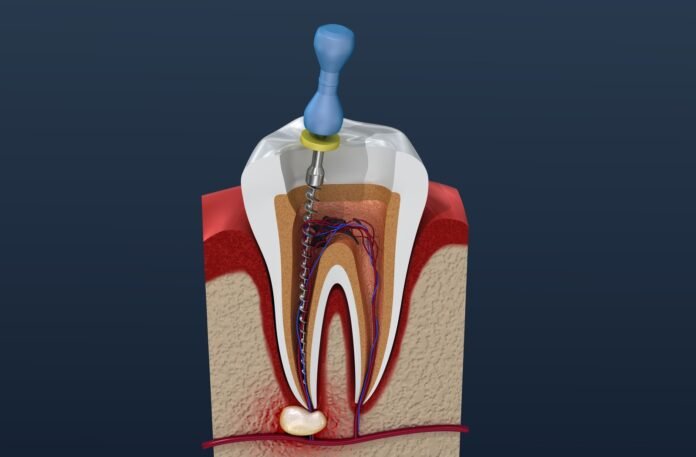When dealing with a painful tooth, it’s common to feel concerned about potential treatment options. One of the most frequently recommended treatments for saving a severely decayed or damaged tooth is a root canal. This procedure is often suggested to prevent the need for extraction, allowing patients to keep their natural tooth for years to come. In this article, we’ll explore how root canals work, their benefits, and what to expect from the procedure.
Understanding the Need for a Root Canal
Teeth can become damaged due to deep decay, repeated dental procedures, or injury. When the soft tissue inside the tooth, called the pulp, becomes infected or inflamed, it can lead to serious pain and discomfort. Infection in the pulp is often what causes that throbbing, intense toothache that may prompt a visit to a dentist. Fortunately, root canals can effectively address this problem, providing relief and preventing the need for extraction.
Root canals are a popular treatment option offered by experienced root canal doctors in Udaipur who aim to relieve pain while preserving the natural structure of the tooth.
What Happens During a Root Canal Procedure?
A root canal treatment is a multi-step procedure that may require one or more visits to the dentist. Here’s a quick overview of what happens during a root canal:
- Numbing the Area: First, the dentist numbs the tooth and surrounding area to ensure the procedure is comfortable. Modern anesthesia techniques make root canal treatments more manageable and pain-free than ever before.
- Removing the Infected Pulp: After numbing, the dentist carefully removes the infected or damaged pulp. This step is essential to stop the infection from spreading further into the tooth or gums.
- Cleaning and Shaping the Canals: The dentist cleans out the canals and shapes them to ensure the area is free of bacteria and any remaining debris. This step is crucial for preventing any future infections in the treated tooth.
- Filling the Tooth: Once the canals are cleaned and shaped, they are filled with a rubber-like material called gutta-percha. This seals the space to keep out any contaminants.
- Final Restoration: Finally, a crown or filling is placed on top of the tooth to restore its function and appearance. Crowns are particularly effective for strengthening the tooth after a root canal.
Benefits of Getting a Root Canal
Root canals offer several benefits, especially when performed by the best dentist in Udaipur. Some of the key benefits include:
- Pain Relief: A root canal addresses the source of pain and provides immediate relief from the discomfort of an infected tooth.
- Preserving Natural Teeth: By removing the infection rather than the tooth itself, a root canal allows patients to retain their natural tooth structure, which is essential for maintaining a healthy bite and jaw alignment.
- Long-Lasting Results: With proper care, a tooth that has undergone a root canal can last a lifetime, making it a worthwhile investment for oral health.
- Preventing Future Issues: Removing the infected pulp prevents the spread of infection, protecting surrounding teeth and gums from further complications.
Root canal doctors in Udaipur emphasize the importance of preserving natural teeth whenever possible. Root canals are an effective solution for treating infections, allowing patients to avoid tooth extractions.
How to Care for Your Tooth After a Root Canal
Proper care after a root canal is essential for healing and maintaining the results. Here are some steps to help ensure a successful recovery:
- Practice Good Oral Hygiene: Brushing and flossing daily helps keep your treated tooth and surrounding teeth healthy. Make sure to avoid hard foods that could damage your treated tooth.
- Attend Regular Check-ups: Follow-up visits with the best dentist in Udaipur ensure that your treated tooth is healing well and that no further issues are developing. These check-ups also help catch any potential dental problems early.
- Avoid Excessive Pressure: After a root canal, it’s wise to avoid biting down on hard objects, especially if a temporary filling is in place. This helps prevent any potential damage to the tooth during the healing phase.
- Maintain a Balanced Diet: Eating nutritious foods supports overall oral health and promotes a strong immune system, helping your tooth recover.
When Is Extraction Necessary?
Although root canals are highly effective, there are instances when a tooth may still require extraction. This may happen if the tooth is severely damaged or if the infection is too extensive to treat successfully. In such cases, removing the tooth can protect overall oral health and prevent further issues.
However, thanks to advancements in dentistry, root canal treatments have become increasingly successful, offering patients a reliable way to avoid extraction whenever possible. Consulting with skilled root canal doctors in Udaipur can help determine the best treatment path for each individual case.
Conclusion
A root canal is a valuable dental procedure that can save a tooth from being pulled. By addressing infections at their source, root canals relieve pain, preserve natural teeth, and help maintain overall oral health. If you’re experiencing tooth pain or suspect you may need treatment, visiting the best dentist in Udaipur can provide clarity and guidance on whether a root canal is right for you. With proper care, a tooth that has undergone a root canal can serve you well for years, helping you maintain a healthy, confident smile.


